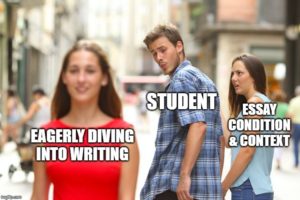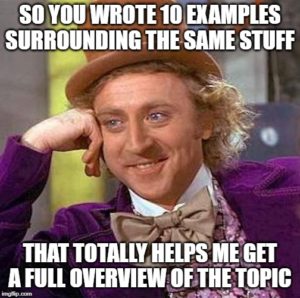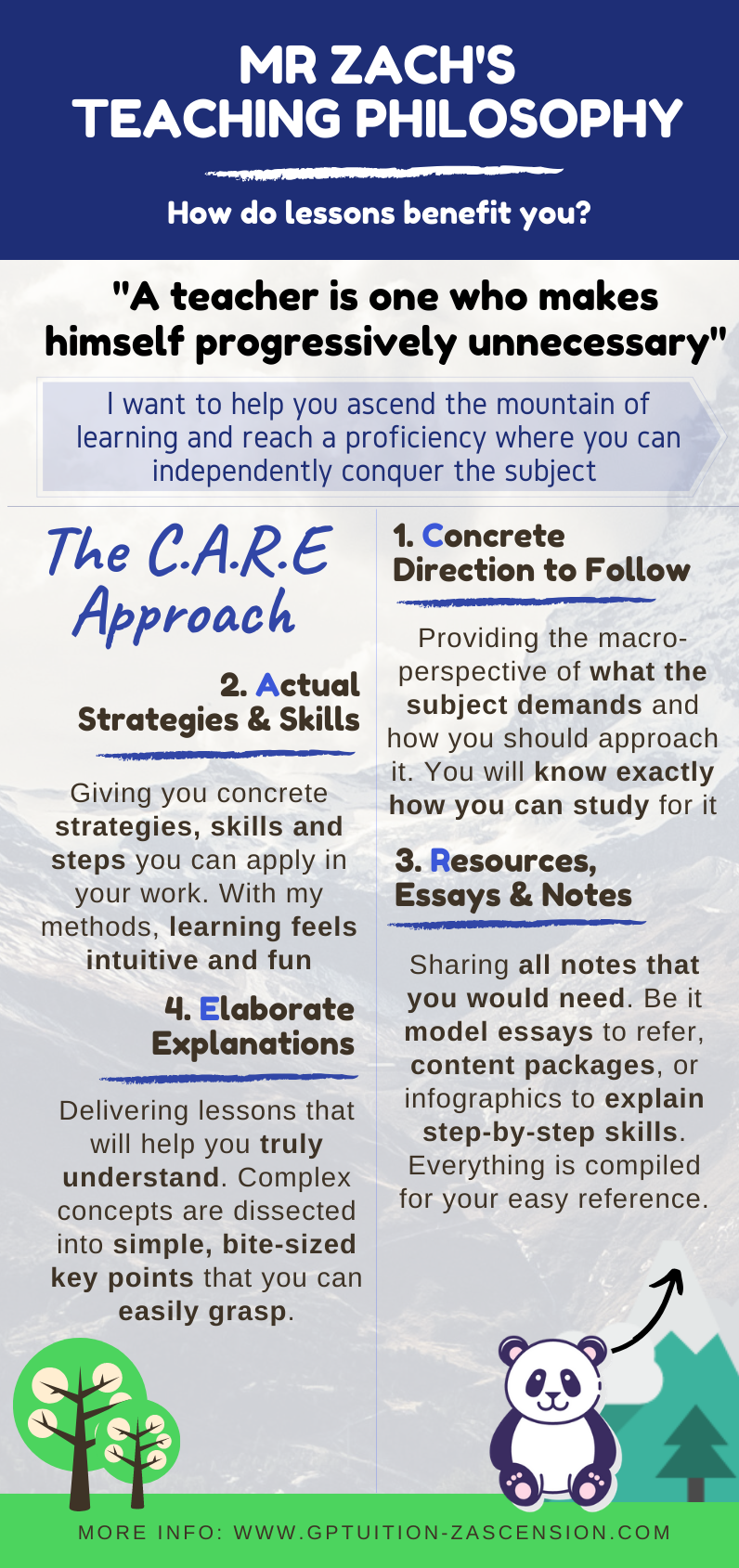How to Improve GP Essay? (5 Mistakes to Avoid)
1. Not Answering Directly to the Question
Students often forget what the question is asking for when they start writing. They will focus on getting all the points out, but often these are not given credit because they do not answer the question. Take for example the 2018 A level question: “How far is failure an essential part of success?”
Compare the following answers-
A: “Failure is important because it helps us gain wisdom that we would otherwise have not realised”
B: “Failure helps us achieve success by providing us with new wisdom that is important”
C: “Failure is indispensable for success because it provides wisdom that we will need in the strive for success. Success involves making the correct decisions and avoiding pitfalls, all of which are gleaned from the lessons of past failures.”
A and B are both incorrect. A does not even talk about success, it merely discusses failure and students tend to do this where they forget the most important keywords in the question that they have to address. B is wrong because it has neglected the keyword “essential”, contributing to success does not mean that it is essential. C is correct because it addresses the nuance of essential and it goes us to explain exactly HOW the wisdom is NEEDED in success.
You will probably realise here that elaboration is key to strengthening your argument. Elaboration is also the tool that will help you address the question requirements adequately so don’t be afraid to explain what exactly you mean, especially in your topic sentence! (Quick tip: keep asking yourself what the question is asking you about and aim to answer that!)
2. Forgetting Conditions and Contexts in the Question
One single word can completely change the requirement in the question and these words are what we call modifiers. Modifiers make your job a little harder because you have to take them into account when you are writing.
The problem is students have a habit of looking past them or mistakenly thinking that they have already addressed them. To overcome this, you need to know what you have to do when you see a modifier, in other words HOW to address them. (Quick tip: do not skip the planning phase to jump into writing, it’s like booking an air ticket without knowing where you want to go!)
Look at this question from 2018 A levels: “To what extent is the pursuit of continuous economic growth a desirable goal?”
Many students explained how the pursuit of economic growth is desirable and they spend the whole essay talking about whether it is desirable or undesirable. That is only getting half of the question correct.
They are missing out on the important context of “Continuous economic growth”. Continuous is extremely important because it is no longer about arguing whether we should pursue economic growth, it is about whether we should keep pursuing it endlessly. The essay that ignore this idea of perpetuity can end up failing because it is not answering the question.
Pretty scary isn’t it? Just a slight overlook of one word in the question is enough to send the essay tumbling down the path of no return.
You can address continuous by explaining how economic growth persists amidst different scenarios, like when a country already enjoyed economic successes, in times of crises, or when there are other priorities that have not been met be it developing the arts scene or engaging in environmental conservation etc. Basically, you have to show how economic growth should/should not be pursued throughout different events. If you argue that it is undesirable you are basically saying there are scenarios in which the pursuit of economic growth should not continue.
3. Lacking Elaboration and Depth in Arguments
The making of an A essay depends a lot on the depth in arguments and some students mistake that for spamming examples. Argument + Examples are two separate things that are intertwined, but a lack of argumentation cannot be made up for through better examples. So what is an argument?
It is basically logic. You are trying to argue how X leads to Y and then to Z. It is a sequence where one point flows to another. Lacking elaboration will cause leaps of logic. For the same reason, a really really short essay tends not to score (Quick tip: you should have at least 12-15 lines per body paragraph)
Consider this 2018 A levels Question: “Foreign aid does not solve long-term problems.’ To what extent is this a fair viewpoint?”
Compare the following answers –
A: Foreign aid often ends up doing more harm than good. Countries are left in a worse state than before because they end up with having even more problems.
B: Foreign aid fails to target the roots cause of problems and merely creates the facade of alleviating them. In the period of receiving foreign aid, the country remains in a state of ignorant bliss where the problems continue to fester. Hence, foreign aid instead of alleviating long-term problems, could even end up exacerbating them. Many problems require internal ailments to be resolved instead of simple foreign monetary support.
In A, the student does not discuss the idea of “solving”. The student asserts that foreign aid results in more problems but does not explain HOW and WHY this happens. It does little to persuade the reader and the reader is left confused about the student’s rationale for such a negative view of foreign aid.
In B, the logic is very clear here. Notice that the student goes into detail with the reason and can explain exactly how the process unfolds after a country receives foreign aid, whereas the student in A gives a very general statement without depth.
4. Failing to Show Significance of Example, Merely Describing
Being descriptive is an easy trap to fall into. It is so tempting to regurgitate details you know about examples, or maybe you feel that there is a need to provide facts relating to the example. The key here is knowing when to stop. Remember that the end goal is answering the question, not providing a recount of something that has happened.
In other words, you are supposed to tell the reader why you have chosen this example and how it relates to the question. To do so would be showing the significance of the example. Try asking “So What?“. Avoid going into storytelling mode, instead try being more argumentative and thinking about the implications of the example.
Take for example a question about the power of media in creating social change. If I were to bring up the Me Too movement and explain how this movement has gained a lot of traction and went viral to bring attention to the problem of sexual harassment, that is simply describing. I can go on to give names and that is still at the describing stage. It does not tell me anything about social change. (Quick tip: facts in examples are useful but they do not replace the need for proper explanation!)
So what if there was a Me Too movement, and so what if it was popular? You need to explain that the movement revealed the prevalence of sexual harassment and raised awareness about the severity of the problem. This awareness is the effective first step to change and also sparked many concrete improvements like how states ban nondisclosure agreements that cover sexual harassment or improving the legal protection and recourse available etc. The key idea here is how social media leads to change and you are using the Me Too movement as an example to demonstrate this change.
5. Having an Overly Narrow Scope
This is one easy way to tell a strong and weak essay apart. The strong essay aims to give a comprehensive discussion of the topic whereas the weak essay only considers certain examples and forgets about many others. The weak essay feels like it just cherry picks the examples that substantiates its view while conveniently ignoring the many other examples that sing a different tune.
Let’s say we have a topic like Science and Tech and the question asks whether Science and Tech has made our lives better. A student may argue that Science has created many inventions that have improved our quality of living and solved our problems. He/she may then point to the various modern inventions.
However, that is merely one area of science. What about in the area of warfare, or agriculture or eugenics or energy? These areas could very well paint a different picture of science and it is important to discuss them. You need to show the examiner that your conclusion is an informed one that you arrived at after evaluating the whole picture and not just a stand you randomly prefer. (Quick tip: know the whole range of examples you wish to use at the planning stage, so that you can check whether you covered enough ground)
_____________________________________________________________________________________________________________________
If you found this useful, check out our new GP Tips & Resources Telegram Channel! Click here to join. This channel is meant to act as a GP companion to share knowledge and help all students, regardless of whether they are a part of ZAscension.
Everyday there will be Tips of the Day, Answers to FAQs, Articles and many more. So if you enjoyed this article, this channel will definitely be useful for you 😃 I am very passionate about sharing knowledge, let’s help to build this community to enhance the pool of collective knowledge!
We are happy you stopped by ZAscension! If you need extra help that is more comprehensive and more personalised, don’t be afraid to seek it, we are more than happy to guide you in this journey.






